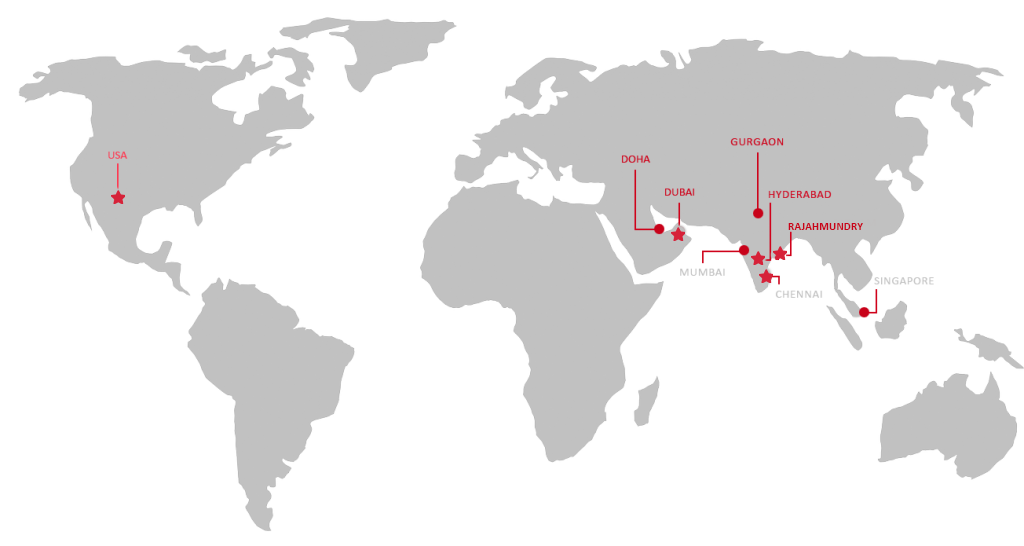 Businesspeople continually dissect the data procured from employees, customers, and other sources to identify operational challenges as well as opportunities of enhancements across their organizations. However, Infolob commonly observes organizational limitations to adequately leverage all available data/information – invariably due to three factors: unstructured form, huge volumes, and siloed on-premise.
Businesspeople continually dissect the data procured from employees, customers, and other sources to identify operational challenges as well as opportunities of enhancements across their organizations. However, Infolob commonly observes organizational limitations to adequately leverage all available data/information – invariably due to three factors: unstructured form, huge volumes, and siloed on-premise.
Consequently, the concepts of data science, big data analytics, and cloud have garnered tremendous attention in the past decade. IDC estimates the big data and business analytics solutions market revenue at $274.3 billion by 2022, whereas Gartner projects the global cloud service industry to attain a valuation of $331.2 billion by 2022.
Thriving Data Science and Cloud Demand
Simply put – if the information is power for businesses, data is the fuel that creates that power and data science is the engine that transforms that power into actionable information; and the cloud is the drone that adds mobility to the data. Infolob sincerely recommends Oracle cloud data science tools and infrastructure that utilize scientific methodologies, algorithms, processes, and systems to derive desired and precise information from all procured data to aid decision making.
Following summarizes why cloud-backed data science is emerging as the secret sauce of thriving businesses:
- Managing mountains of unstructured data
- Ability to process all types and volumes of data efficiently
- Extracting value from all procured data to support decision making with precise and quantifiable evidence, accessible anytime and everywhere.
Database Dominance Makes Oracle Cloud Data Science an Ideal Choice
Oracle is an undisputed leader among database providers, offering best-in-class software products and engineered systems. The sheer dominance of Oracle databases makes its advanced analytics tools an obvious choice, particularly now when it is not necessary to move data to designated analytics servers.
Oracle Cloud Infrastructure is customized for artificial intelligence and machine learning workloads, offering a better return of every dollar spent on the cloud, ensuring  network performance and clustered networking across hundreds of GPUs, and enabling access to cutting edge computing power. Moreover, Oracle acquired DataScience.com in 2018 to further strengthen its cloud data science potency. The Oracle Cloud Infrastructure Data Science service creates a platform for data scientists to successfully engage data engineers to build, train, and deploy machine learning models on the Oracle Cloud. On the other hand, the older method is time-consuming and involves latency, governance, and scalability issues.
network performance and clustered networking across hundreds of GPUs, and enabling access to cutting edge computing power. Moreover, Oracle acquired DataScience.com in 2018 to further strengthen its cloud data science potency. The Oracle Cloud Infrastructure Data Science service creates a platform for data scientists to successfully engage data engineers to build, train, and deploy machine learning models on the Oracle Cloud. On the other hand, the older method is time-consuming and involves latency, governance, and scalability issues.
Oracle R Technologies Offer Unparalleled Cloud Data Science Tools
Oracle R is the official language and environment developed for data analysts, statisticians, and data scientists to execute advanced analytical programs as well as generate complex presentation graphics. Initiated in 1994 as an alternate to SPSS, SAS, and other statistical platforms, R is an open source language with thousands of free-to-use packages. Following are some of the key attributes of Oracle R that makes it a highly useful cloud data science tool:
- An Oracle R environment is powerful, offers OOTB functionality with many ‘knobs’ with smart defaults, and generates graphics effortlessly
- Third-party open source IDEs such as Rstudio are easily compatible
- Addresses all four key customer concerns: scalability, performance, production deployment, and reluctance to change language and environment, as R uses same paradigm and SQL is not required. R technologies are holistic in terms of designing, coding, testing, and deploying.
There are four segments of Oracle R Technologies:
1. Oracle R Distribution
a) Provided as a free download from Oracle and enhanced with dynamic loading of high-performance linear algebra using Intel’s Math Kernel Library (MKL), AMD’s Core Math Library (ACML), and Solaris Sun Performance Library
b) Elevate R scalability at client and at database server for embedded R execution
c) Enterprise support for customers of Oracle Advanced Analytics option, Big Data appliance, and Oracle Linux
2. Oracle R Enterprise
a) Integrate Oracle database with R language
b) Construct a comprehensive and database-centric environment for end-to-end analytics in R with real-time deployment to production environments
c) Overcome the need to port R code and leverage the entire R scripts in production applications
c) Effortlessly utilize Oracle database as HPC environment for R scripts, prevailing data parallelism and resource management
d) Eliminate memory constraints of client R engine and enable integration and management via SQL
e) Integrate R into the IT software stack such as OBIEE
3. Oracle R Advanced Analytics for Hadoop
a) Expand on resources indulged in building models on Hadoop
b) Deliver analytics that scale data volumes, variables, and techniques
c) Provide transparent access to Hadoop Cluster
d) Manipulate data in HDFS, database, and file systems
d) Write and execute MapReduce jobs with R
e) Leverage CRAN R packages to work on HDFS-resident data
f) Transition from lab to production without needing knowledge of Hadoop internals, Hadoop CLI, or IT infrastructure
4. ROracle
a) An open source R package developed and maintained by Oracle
b) Optimized for Oracle Call Interface (OCI) libraries to handle database connections with a high-performance and native C-language interface to Oracle database
Benefits of Oracle Cloud Data Science
Oracle Cloud Infrastructure Data Science lays an ideal platform for the modern data scientists who prefer python for its drag-and-drop interfaces, have data on cloud, and deal with organizing a large team. Infolob observes that these modern data scientists are invariably responsible for end-to-end delivery of a data science projects, from conceptualizing to production, and manage training and updating of production code and algorithms. In this scenario, absence of a centralized infrastructure, limited access to complete data sources, and the lack of budget for large compute hinders their progress. To aid these modern data scientists, Oracle cloud data science offers following benefits:
• Collaborative:
The platform is designed to enable data scientists to work together with features of granular access control and security while centralizing and organizing assets at one place. Create ‘Projects’ to centralize, organize, and document a team’s work; ‘Model Catalog’ to audit models and enable reproducibility; ‘Notebook Sessions’ for python analyses
• Scalability:
Unmatched speed and scale of Oracle Cloud hardware helps scientists to execute big data queries without needing DevOps expertise
• Performance:
Oracle Cloud Data Science merges latest open source machine learning toolkit with Oracle analytics technologies to serve data scientists their preferred tools and libraries; ‘Accelerated Data Science SDK’ to make common data science tasks faster, easier, and less error-prone
How Infolob Aspires to Help
Infolob recently completely its 10th anniversary, which is solely attributed to our clients for trusting us with the responsibilities of their IT requirements. Infolob earned Oracle Platinum Partner status in 2013 and is currently focused on serving the public and private sectors across the U.S. with its cloud and data science expertise, among others.





